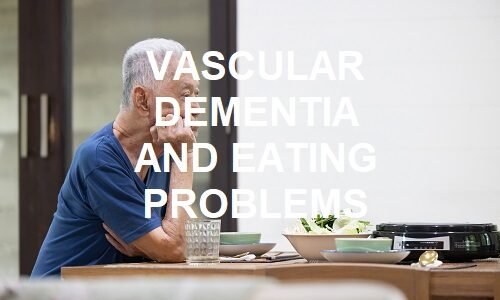Diet for dementia patients is a major aspect of managing the disorder, even more so when the patient is suffering from vascular dementia and eating problems. Vascular dementia is a condition caused by a reduced flow of blood to the brain. The condition leads to various challenges, the most prominent of which are eating difficulties.
As vascular dementia progresses, individuals often suffer from nutrition-related issues, which necessitate a very careful management strategy.
Vascular Dementia and Eating Problems
In this brief, not only are we going to look at the problems that are commonly associated with vascular dementia, but we are also going to give an insight into coping strategies and approaches for these problems.
Eating Challenges in Vascular Dementia

Vascular dementia has the ability to affect various cognitive functions. Most important of these cognitive functions are memory, attention and executive functions – basically the functions which can influence an individual’s ability to eat independently.
Vascular dementia patients often experience difficulties in coordination, swallowing, and even recognizing the food on the plate in front of them. All of these problems snowball to create significant mealtime challenges.
Let us talk a bit more about these mealtime challenges in vascular dementia in detail in the following lines.
Arguably, the biggest challenge that comes with vascular dementia is that it can alter a person’s sense of taste by a significant factor. This eventually results in a diminished appetite or a complete aversion to familiar foods.
Hence, it becomes quite a challenge for a dementia care specialist to provide adequate nutrition. Then, even if the sense of liking a particular meal is there, individuals often suffer from forgetfulness and disorientation. They often tend to forget to eat, drink or have a lot of difficulty in remembering how to prepare their food in the first place.
Naturally, what then follows is an irregular eating pattern, leading to inadequate nutrition. And lastly, vascular dementia is a dreadful condition in the sense that it can impact the muscles that are involved in swallowing. Hence, the risk of choking and aspiration becomes quite pronounced, resulting in respiratory issues and a reluctance to eat.
Coping With the Challenges

As you can see, the challenge in the case of vascular dementia cannot be overlooked easily. But coping with vascular dementia and eating problems isn’t something impossible.
One has to be calm and patient; that is all that matters. Start by creating a structured and supportive mealtime environment. The idea here is to minimize distractions by using the same set of dishes and utensils, maintaining a consistent meal schedule and promoting regular eating habits.
Then modifying the food texture and consistency is also an adaptation that many dementia caregivers adopt. This is particularly useful when a patient suffering from dementia has trouble swallowing food. Purred options that are easier to swallow are the first choice.
However, consultation with a speech therapist and dietitian before switching to this form of meal is important. Also, for the sake of maintaining a sense of dignity and autonomy in individuals suffering from vascular dementia, dementia caregivers often try to encourage feelings of independence in their patients.
Dementia patients are often most comfortable with finger foods and adaptive utensils that they find easy to manage. So, no wonder that caregivers often include them in their routine.
Vascular Dementia Nutrition Management: A Perspective

There are certain sub-constituents of vascular dementia diet management that we will discuss briefly in the following lines:
Consulting with a registered dietitian is of pivotal importance.
Only a registered dietitian with expertise in dementia care has the ability and patience to create personalized nutrition plans. These nutritional plans meet the dementia patient’s needs and preferences admirably.
The most important part of these plans is to address nutrient deficiencies and support the overall health of the dementia patient in question.
Hydration
Hydration management is often overlooked when dementia specialists are not in charge. Ensuring adequate hydration in vascular dementia patients can solve a lot of problems, such as anxiety and restlessness, partially at the very least. Offer fluids frequently throughout the day, and consider offering water in containers of a patient’s choice.
Nutrient-dense foods
Prioritize nutrient-dense foods to provide essential vitamins and minerals. Here, the idea is to add as many fruits, vegetables, whole grains, lean proteins, and healthy fats into the diet as possible.
Supplements
In the case of some vascular dementia patients, especially those who suffer from Sundowning dementia, supplements become important for addressing specific nutrient deficiencies. However, one must consult with a healthcare professional or dietitian before introducing any supplements into their daily routine.
Final Thoughts – Vascular Dementia and Eating Problems
Vascular dementia is a massive challenge in the world, where things often become blurry and confusing. But with just a few tweaks in the right direction, this problem can be managed and mitigated.
Vascular dementia and eating problems can be countered by a clever plan, one that is devised on the lines discussed in this brief. If that can be done at an early stage, especially when one spots early signs of dementia in women and men, things can be a lot easy later!
References
- Uwagbai, O., & Kalish, V. B. (2022). Vascular Dementia. In StatPearls. StatPearls Publishing.
- Venkat, P., Chopp, M., & Chen, J. (2015). Models and mechanisms of vascular dementia. Experimental neurology, 272, 97–108.

